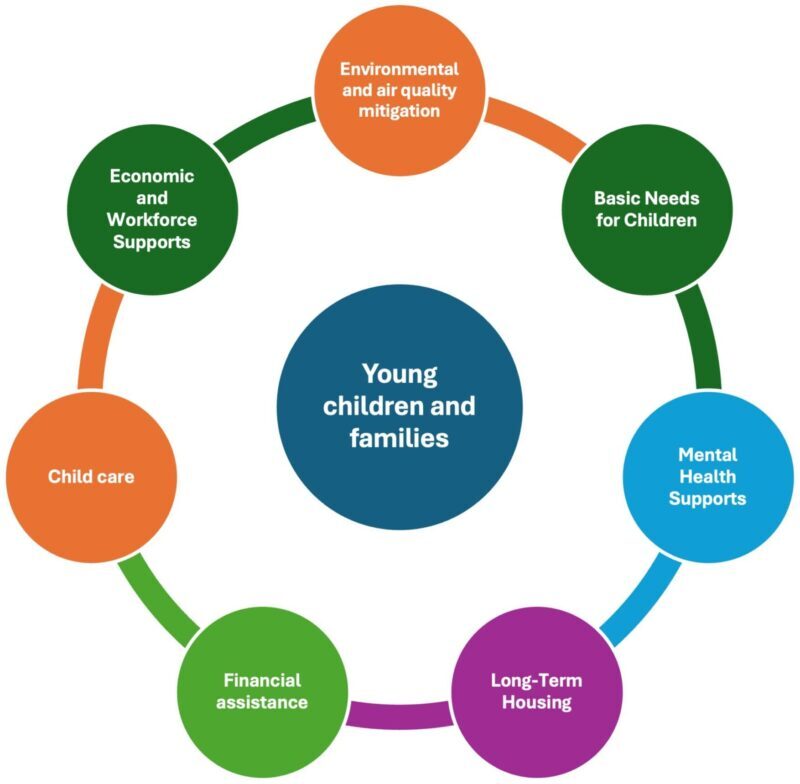March 27, 2025
Dr. La Tanga Hardy, EdD is a Faculty Member at Los Angeles Trade-Technical College where she is also the director of the Child Development Center. Dr. Hardy is a passionate educator and advocate for early childhood education. She holds a Bachelor’s in Child Development, a Master’s in Family and Consumer Science, a Master’s in Educational Administration, and a Doctorate in Educational Leadership from California State University, Northridge.
Her dissertation, titled “Shifting out of Neutral: How Anti-Blackness is Being Addressed in Preschool,” reflects her commitment to addressing issues of equity in early education. Currently, Dr. Hardy’s research focuses on “Getting into Good Trouble in Early Education,” exploring ways to move beyond the “one size fits all” approach and create more inclusive, equitable learning environments for our youngest learners.
What inspires you as a woman educator, mentor and leader?
As a woman educator, mentor, and leader, what inspires me most is the opportunity to empower others to reach their fullest potential. I’m deeply motivated by the idea that education is transformative, not only for individuals but for communities. I want to inspire those I work with to believe in themselves, challenge their own limits, and develop a sense of purpose that drives them to create positive change.
The resilience and strength of my students and colleagues, especially those who face obstacles in their educational journeys, push me to keep going and to keep advocating for equitable opportunities. Being a woman in a leadership role also inspires me to break barriers and set an example, showing that leadership isn’t limited by gender but rather by the ability to inspire and uplift others.
As an African American woman standing on the shoulders of my ancestors, I am inspired by the legacy of resilience, strength, and determination that has paved the way for me. I feel a deep responsibility to contribute to building a prepared and more diverse workforce, ensuring that future generations have the tools and opportunities to thrive in an ever-changing world.
Ultimately, what drives me is knowing that the work I do can have a ripple effect, fostering growth and creating a more inclusive environment for future generations.
Over your career of shaping future early educators, how do you inspire them to be the best educators they can be?
Throughout my career of shaping future early educators, my approach to inspiring them to be the best educators they can be revolves around fostering a deep sense of purpose, passion, and responsibility. I believe that when early educators understand the profound impact they have on shaping the lives of children, they are motivated to give their best every day.
Here are a few ways I inspire them:
- Leading by Example: I make it a point to model the qualities I want to see in them—patience, empathy, and a lifelong commitment to learning. I strive to create an environment where they feel respected and valued, showing them how to create that same nurturing atmosphere with the children they will one day teach.
- Empowering Their Voice: I encourage them to find their own teaching style and voice. I emphasize that every educator has unique strengths, and it’s important to embrace those qualities while continuously evolving and adapting to the needs of their students.
- Encouraging Reflection: I ask them to regularly reflect on their experiences and decisions. Reflection helps them recognize their growth and areas where they can improve. It also helps them stay connected to the “why” behind their passion for teaching.
- Emphasizing the Importance of Relationships: Building strong, trusting relationships with students, families, and colleagues is foundational to being an effective early educator. I teach them that education goes beyond academics—it’s about creating a sense of belonging, safety, and connection for every child.
- Instilling a Growth Mindset: I challenge them to see every challenge or mistake as an opportunity to grow. The path to becoming an exceptional educator is filled with learning moments, and I want them to embrace those moments with confidence and curiosity.
- Encouraging a Lifelong Commitment to Learning: I remind them that as early educators, they must continually seek knowledge, stay current with educational practices, and be open to new ideas. The world is always changing, and their ability to adapt and learn will help them remain effective and inspired.
Ultimately, I aim to inspire them to approach teaching as both an art and a science, one that requires both heart and mind. I want them to feel empowered to make a difference, knowing that they are not only educators but also the architects of future generations.
What traits do you believe are most essential for an early educator to have to inspire their young students?
For an early educator to truly inspire their young students, there are several key traits that are essential:
- Patience: Young children are still learning how to navigate the world around them. A patient educator creates a calm, nurturing environment where children feel comfortable to explore, make mistakes, and learn at their own pace.
- Empathy: Being able to understand and respond to the emotions and needs of children is crucial. An empathetic educator can connect with students on a deeper level, helping them feel valued, understood, and supported.
- Creativity: Young children learn best through play and imaginative activities. A creative educator can design engaging lessons that capture children’s attention and make learning fun and exciting.
- Communication Skills: Effective communication is key when working with children, especially when trying to explain concepts in a way that they can understand. It’s also important for building strong relationships with parents and caregivers.
- Flexibility: The classroom environment, especially with young children, can change quickly. A good educator must be adaptable and willing to adjust their approach to meet the needs of each child and the situation at hand.
- Positive Attitude: Children are influenced by the attitudes of those around them. A positive, enthusiastic approach to teaching can inspire a love for learning and encourage children to stay curious and excited about new experiences.
- Strong Classroom Management: While it’s important to create a warm, welcoming environment, it’s also essential to have clear boundaries and routines. A teacher who can manage a classroom effectively ensures that children have the structure they need to thrive.
- Passion for Education: When an educator is genuinely passionate about teaching, it’s contagious. Young children pick up on this energy, and it can inspire a lifelong love of learning.
- Resilience: Working with young children can be challenging. An educator needs the resilience to overcome daily challenges, maintain their composure, and keep focused on the bigger picture of student growth and development.
- Cultural Awareness: A strong understanding of the diverse backgrounds and experiences of students helps an educator create an inclusive environment that celebrates differences and promotes respect and understanding among children.
Together, these traits help create an environment where young students feel encouraged, valued, and inspired to learn and grow.
You have a unique role in influencing future generations. If you could name one quality, you’d like for young children in an early education setting to leave with, what would it be and why?
If I could name one quality that I’d like young children in an early education setting to leave with, it would be curiosity.
Curiosity is the foundation of lifelong learning. When children develop a natural sense of wonder and the desire to ask questions, they begin to take ownership of their learning journey. Curiosity encourages them to explore, make connections, and build problem-solving skills that will serve them well throughout their lives. It empowers them to seek answers, face challenges with creativity, and understand that learning is a continuous process, not just something that happens in the classroom.
But equally important is nurturing a love of learning. School should be a place where children feel excited to come each day, a place where they feel seen, valued, and safe. When children feel they belong in the learning environment, their curiosity flourishes. They are more likely to take risks, engage deeply, and enjoy the process of discovering new things. A loving, supportive classroom atmosphere helps children build confidence, knowing that they can make mistakes, grow, and be embraced for who they are.
By fostering both curiosity and a love for learning in a nurturing environment, we’re not just teaching children academic skills, but we’re helping them develop a mindset that is open, inquisitive, and resilient. This foundation will fuel their passion for learning and ensure they carry that enthusiasm with them into their future.”








